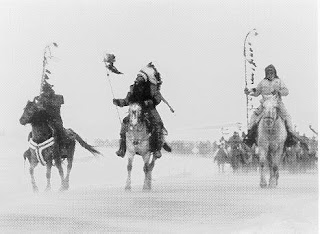Sovereignty

There are many ways to understand the concept of Sovereignty. There is a legalistic way of understanding the concept which is from a collective view point that is prescribed to tribal governments. These are a few of the ideas that people have that describe the idea of Sovereignty. The first three are what most Indians think sovereignty is as it relates to our tribal governments. The last three relates to the individual and may not be associated with the term.
1. the right to self-government without interference from outside
2. the right or power to enforce rules or give orders
3. the power to act on behalf of somebody else
4. independence with the freedom to make decisions on how to live
5. the freedom from dependence on or control by another person,
6. existing as moral agents to decide right from wrong
2. the right or power to enforce rules or give orders
3. the power to act on behalf of somebody else
4. independence with the freedom to make decisions on how to live
5. the freedom from dependence on or control by another person,
6. existing as moral agents to decide right from wrong
As we become more aware of the idea of Sovereignty we will learn that it is a dynamic process that has to be regenerated, rediscovered, understood and most of all actually practiced. The more it is practiced the better understood it becomes and the more we will be committed to living with Personal Sovereignty and applying it to our tribes.

Personal Sovereignty is not just a theory although it can be understood in a theoretical manner. It’s more about a person’s personal independence and their capacity to make moral decisions and act on them. How a person chooses to live, work, play, give, etc. is all about their personal beliefs and if we can instill in our tribal members a clear understanding of their personal commitment to be sovereign we can began the long climb out of poverty on the reservations. The way we choose to live is tightly woven in with tribal sovereignty.
If our tribal leaders did not have to spend 90% of their time dealing with the problems facing our families more time could be spent planning, investigating, and developing the infrastructure needed to have self-sustaining economies. Because so many of our people have become dependent rather than independent the tribal administration has to constantly come up with creative ways to meet the needs of the people.
The Lakota for thousands of years had self-sustaining Tiyospayes that took care of the needs within the group. It has only been the last 100 years, less than four generations that we went from totally independent family groups to dependent individuals who need their basic needs met by outsiders. We curse the federal and state bureaucracies but if we woke up one day and every single office was closed and all of the workers left the reservations never to return would we survive? Some families would but many would not. How many of our families would know how to live from the land? We have been deprived through dependency of our cultural knowledge our ability to exist within the environment that was our birthright.
John Mohawk, a Seneca of the Haudenosaunee (Iroquois Nation) spoke about if we were to truly understand Sovereignty we needed to “…study it and make it the goal in every major area of social life.”
He outlined five areas of sovereignty that a people must control and exercise in order to achieve sovereignty. Beyond the important area of self-governance and conflict resolution, he cited land and economics, health and reproduction, education and socialization of children, and the realm of the mind and spirit or the psyco-spiritual. In each of these five main areas, he instructed the group of activist, “all our personnel, our teachers in the schools, our nurses in the clinics, our counselors, our businessmen, and economic planner, all need to strive to have a sovereign-minded strategy for the rebuilding of their community and nation.” His prescription for a Native tribal sovereignty was thus more than just about government, but intended to involve everyone working in these five major areas of endeavor to think and act sovereign in their assertion of being “a people”. (Thinking in Indian: A John Mohawk Reader, Edited by Jose Barreiro: 2010. Pg. xx)
All of us who talk about “Sovereignty” need to take this advice to heart and began to incorporate it into all areas of our lives. Our people need to live with personal sovereignty and learn to take care of themselves. We need to relearn how to feed ourselves, live without always depending on the tribe, the federal or state government to take care of our basic needs. We need to begin to live healthy lives so our dependency on the Indian Health Service isn’t crucial to our survival. Our traditions are still intact, we can use the teachings and moral codes to make the necessary changes we will have to create the opportunity to achieve this dream of true sovereignty.

No comments:
Post a Comment